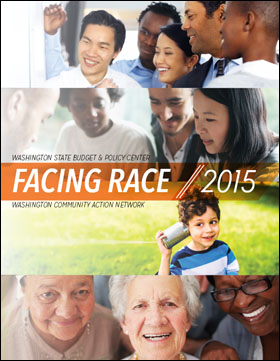STATE GOVERNMENT
Report confronts racial inequality in our state
(Jan. 8, 2015) — In our nation, and especially within Washington state, we like to believe that prosperity and happiness are deserved, earned, and equally achievable by all. Unfortunately, this is not the case.
 A new report, Facing Race, provides a detailed analysis demonstrating the stark racial inequalities that exist in Washington state. Jointly released on Wednesday by the Washington State Budget & Policy Center and Washington Community Action Network and endorsed by more than 50 organizations across the state, the report provides an analysis of the impact of state budget cuts over the past five years and identifies the legislative priorities regarding racial equity for the 2015 session.
A new report, Facing Race, provides a detailed analysis demonstrating the stark racial inequalities that exist in Washington state. Jointly released on Wednesday by the Washington State Budget & Policy Center and Washington Community Action Network and endorsed by more than 50 organizations across the state, the report provides an analysis of the impact of state budget cuts over the past five years and identifies the legislative priorities regarding racial equity for the 2015 session.
“This report recognizes a failure to thoroughly consider the impact of policy decisions on the persistent inequity between communities of color and white communities,” said report author Chris Genese of the Washington Community Action Network. “We are seeing the effects of those decisions deeply hurt Washington’s core health and human services, education, and community safety structures.”
“Washingtonians of color face tremendous inequities that limit their ability to access a high-quality education, become economically secure, and have access to quality healthcare. It is imperative that our state address these racial and ethnic disparities, and the Facing Race report sheds light on the reforms that must occur,” said report author Kim Justice of the Washington Budget & Policy Center.
The report’s findings include:
► A good job is the foundation for economic security, but Black and Latino workers have higher rates of unemployment and are more likely to be in a job that pays a lower wage than the overall population.
► Good health is central to a good quality of life, yet nearly one in three Latinos and one in four American Indians and Alaska Natives lack health care coverage.
► A high-quality early learning experience is crucial to a child’s future, yet three out of four Latino children are not enrolled in preschool.
► Higher levels of education equate to better job security and increased wages, but Latinos, American Indians, and Alaska Natives face the biggest hurdles to college enrollment.
► A strong democracy is dependent on equal representation, but the racial and ethnic composition of the State Legislature does not reflect the state’s diversity. People of color comprise 29 percent of the state’s population, but less than 10 percent of the State Legislature.
Some of the legislative recommendations in the report are:
► Increase access to affordable health coverage to make it attainable to those left behind by the Affordable Care Act. Even with tax breaks, those in our state just above the income threshold for Medicaid often cannot afford coverage.
► Increase the state minimum wage to ensure that all workers in Washington state share in economic growth. Statistics show when people make enough money to maintain basic needs, the entire economy benefits.
► Approve progressive state revenue reforms, including the closure of tax loopholes and the addition of a capital gains tax. As the nation’s single most regressive tax state — where low-income citizens pay the highest portion of their income in state taxes — Washington needs to implement reforms that begin to reverse that trend like the capital gains tax used by 42 other states.
► Legal Financial Obligations are hurting those who have served sentences for past criminal conduct and are struggling to reenter society. Our state needs to enact common-sense reforms that help reduce these burdens by preventing interest from accruing until after release from prison and eliminating the possibility of going back to jail for failure to pay.
► Ensure all workers can earn paid time off when they are sick to prevent the spread of illness and to help workers avoid a more serious, long-term health problems.
► Improve public education by complying with the McCleary ruling and providing equal access to higher education for all children. This is critical to our state’s future economy. The additional investment ordered in the McCleary ruling, which found the state government was not meeting its paramount duty of providing a quality public education system, will decrease drop-out rates, improve training for educators, and start to close the gap for students of color.
With more than 40,000 members, Washington Community Action Network is the state’s largest grassroots community organization. The Washington State Budget & Policy Center is a public policy organization that works to create a just and prosperous Washington state through sound research.





